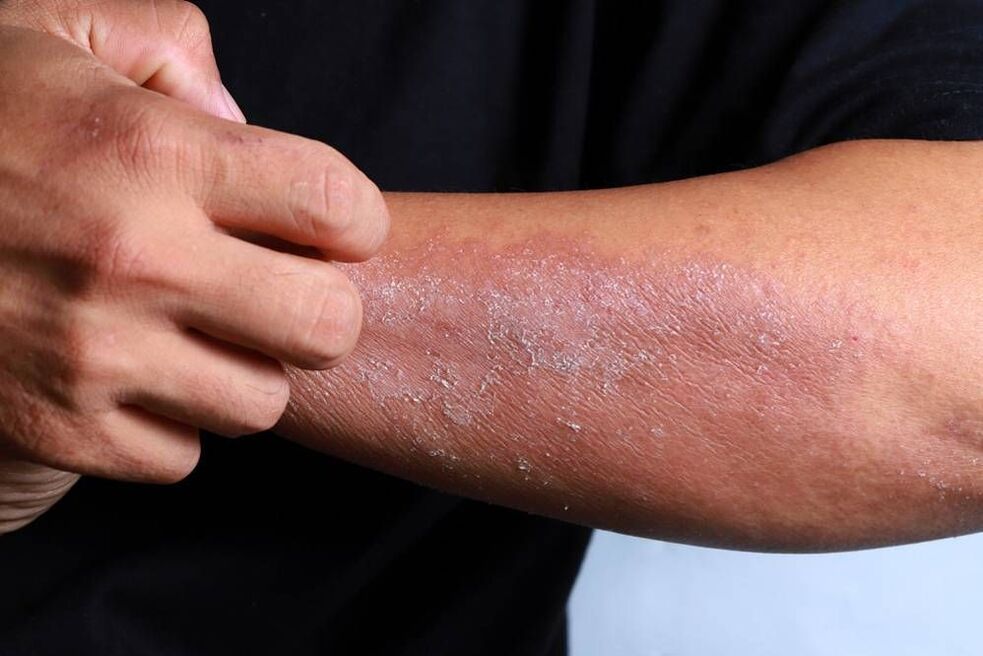
Psoriasisis a chronic inflammatory skin disease. This is an inherited disease, which manifests as a characteristic formation on the patient's body: pinkish-red papules or patches visible to the naked eye, scaly and scaly surface. As a rule, this disease is accompanied by intense itching and pain, which causes pain to the patient both physically and mentally. Psoriasis rashes can appear on any part of the body, but they are most often localized to the scalp, elbows, and hands. Chronic psoriasis on the head is especially often morally uncomfortable for the patient, since it cannot be hidden under clothing.
What is the origin of the name of the disease "psoriasis"?
The name of the disease "psoriasis" comes from the Greek word - Psora - to scratch (-sya). Indeed, itchy, rough, scaly, silvery-white skin that is difficult to treat is a typical picture of the manifestation of this disease.
Who is affected by this disease?
A disease like skin psoriasis affects about 3-5% of the population in different countries. Male and female - equal. Psoriasis can develop at any age, but it usually first appears around the age of 20, often earlier in women than in men. However, Medical On Group has gathered impressive statistics about treating children and the elderly with this condition.
In addition to genetics, psoriasis also has the following causes:
- overactive division of skin cells;
- stress;
- reduced immunity after illness.
Answers to frequently asked questions
Is psoriasis contagious?
Usually, vulvar psoriasis is an inherited disease, inherited with metabolic disorders, endocrine gland damage, and immune system damage. Psoriasis is not contagious! It is not an external infection, and there is no need to fear or hide from these sufferers.
Is it possible that children of parents with psoriasis will also get it?
Since we are talking about an inherited, inherited disease, the probability of this happening is quite high: if both parents have psoriasis, then the children will get it with an approximate probability of 33. 3%.
Is it good for sick people to get as much sun exposure as possible?
It is generally accepted that certain amounts of the sun's rays contribute to the treatment of psoriasis, but in some cases, sun exposure, on the contrary, can aggravate psoriasis. add process. Before performing any medical procedure and if you notice any changes in your skin condition, you should consult a professional dermatologist.
What causes periodic flare-ups and waning of the disease?
Experience has shown that mental stress, stress and neurosis, unhealthy lifestyle and diet are the causes of the exacerbation of psoriasis. In addition, it is not uncommon for the disease to get worse, more precisely as a response to improperly formulated treatment.
Does smoking and drinking alcohol affect the course of the disease?
Yes, it has. Smoking and alcohol consumption adversely affect the development of the disease, which can contribute to the intensification of the manifestations of psoriasis.
Treatment of psoriasis. Is it possible?
Hereditary psoriasis of the feet, hands or head is one of the most common skin diseases, but it is difficult to treat. Psoriasis is characterized by red, scaly patches on the skin, the appearance of which is not caused by infection but by increased cell division. In a healthy person, the complete renewal of skin cells occurs in almost a month, and in one patient - seven times faster.
Exacerbations of psoriasis can be caused by stress and overexertion, wounds and cuts in the skin, streptococcal infections of the upper respiratory tract, and reactions to medications. Unfortunately, it is not possible to protect ourselves from all of this, which means that medicine is not yet able to stop the onset of the disease or to cure it completely. But to control the progression of psoriasis, choose effective symptomatic treatment, modern dermatologists are completely capable.
Can psoriasis be cured permanently?
Because we are talking about an inherited disease, inherited, the treatment of psoriasis of modern medicine goes down to eliminating the external manifestations of the disease, clearing the patient's skin from long-term itching. .

























